Diplomatic Bluebook 2018
Chapter 3
Japan's Foreign Policy to Promote National and Global Interests
1 Development Cooperation (ODA, etc.)
(1)The Current Status of ODA
A FY2017 Priority Policy for Development Cooperation
From the perspective of “Proactive Contribution to Peace” based on the principle of international cooperation, development cooperation is one of the most important tools toward further contributing to securing the peace, stability, and prosperity of the international community, and promoting Japan's diplomatic policies. With the aim of promoting strategic and effective development cooperation based on the Development Cooperation Charter, while also taking reference from diplomatic policies such as the “Free and Open Indo-Pacific Strategy” and guidelines such as the “2030 Agenda for Sustainable Development (SDGs),” the Ministry of Foreign Affairs has positioned the following (items (A) to (C)) as priority issues for FY2017, and will tackle these challenges while strengthening cooperation with various entities.
(A) Improving the environment and sharing universal values to achieve peace, stability, and prosperity of the international community
Based on the “Free and Open Indo-Pacific Strategy,” Japan is committed to improving connectivity between Asia and Africa as well as promoting stability and prosperity of the region as a whole. At the same time, Japan also works to ensure the safety of Japanese nationals working abroad, such as by offering cooperation to efforts by developing countries to improve counter-terrorism measures and the security environment. Based on the concept of sustaining peace, Japan contributes proactively to the realization of peace and stability in the international community through peacebuilding, support for refugees, measures to counter violent extremism, and other efforts, while at the same time strengthening the collaboration between humanitarian assistance and development cooperation. Japan also provides support for efforts by countries that share universal values such as the rule of law, and cooperates in fields including the strengthening of maritime security capabilities and the development of legal systems.
(B) Addressing global challenges and promoting human security towards achieving the SDGs
Japan strategically implements cooperation initiatives towards the achievement of the SDGs, which the international community as a whole is geared towards. In particular, Japan provides support for drawing up national strategies and plans, and also supports human resource development in relation to the formulation and implementation of development policies. It promotes cooperation in fields such as health, women (gender), education, disaster risk reduction and tsunami countermeasures, and climate change and global environmental issues.
(C) Contributing to economic diplomacy and regional revitalization with the aim of achieving “quality growth” alongside developing countries
Japan is involved in cooperative efforts toward the realization of “quality growth” in developing countries, and through that cooperation, contributes also to the growth of Japan alongside with the developing countries, and to regional revitalization in Japan. In particular, Japan works to improve the environment for foreign direct investment, and to support the overseas expansion of local governments and small and medium-sized enterprises, while at the same time further promoting the expansion of “quality infrastructure,” including the promotion of “Japanese style.” Furthermore, Japan provides support for the development of human resources for industries in developing countries, and through new policies, promotes innovation among domestic industries in Japan.
In tackling priority issues (A) to (C) above, efforts are made to organically tie up the initiatives with bilateral cooperation and cooperation through international organizations. At the same time, Japan also promotes companies that enhance Japan's visibility, with the involvement of Japanese private corporations, local government bodies, universities and research institutes, and NGOs and civil society organizations (CSOs). In addition to putting effort into domestic publicity aimed at deepening understanding among the citizens towards supporting developing countries, through development cooperation, Japan also actively communicates information about Japan's initiatives and promotes them to other countries. Japan is also engaged in efforts to strengthen measures to secure the safety of those involved in international cooperation projects.
B Safety Measures for Personnel Engaged in International Cooperation Projects
In the terrorist attacks that struck Dhaka, the capital of Bangladesh, in July 2016, seven Japanese engaged in ODA efforts lost their lives while one Japanese was injured. The Government of Japan is determined to continue supporting developing countries, and to never give in to terrorism; however, the international terrorism situation is becoming increasingly severe. To ensure the safety of Japanese personnel engaged in international cooperation abroad, it is vital to establish a new system for ensuring utmost preparedness.
From the standpoint of such awareness, the Council on Safety Measures for International Cooperation Projects was established under the Minister for Foreign Affairs. After five meetings with participation from many members from the relevant ministries and agencies, the Council published its final report at the end of August 2016, which sets forth new safety measures for personnel engaged in international cooperation projects. The final report covered the safety measures that should be taken in cooperation between MOFA and JICA, with the relevant parties, in accordance with the following five pillars: (1) Strengthening the collection, analysis, and sharing of threat information; (2) Code of conduct of partners and NGOs; (3) Physical/non-physical protective measures, and strengthening training and drills; (4) Post-crisis response; and (5) Heightening crisis management awareness and improving the organizational structure of MOFA and JICA.
Japan will keep up the steady implementation of new safety measures, and ensure the safety of personnel engaged in international cooperation projects, in order to contribute proactively to the peace, stability, and prosperity of the international community as a responsible major power.
(2) Japan's Development Cooperation Performance and Approaches to Major Regions
A Japan's ODA Performance
In 2016, Japan provided approximately 16.81 billion US dollars in ODA3, 11.8% more than the previous year on the basis of gross disbursements. Japan ranks fourth among the member states of the Development Assistance Committee of the Organisation for the Economic Co-operation and Development (OECD/DAC), following the U.S., Germany, and the UK. In terms of net disbursements generally used for international comparison, the amount was about 10.42 billion US dollars, up 13.2% from the previous year, and like for gross disbursements, ranking fourth after the U.S., Germany, and the UK. The ODA/GNI ratio based on net disbursements was 0.20%, ranking 20th among member states of the DAC.
- 3 The main forms of ODA from Japan are: grant aid, namely, bilateral fund donations; loan aid for development in developing regions; technical cooperation; donations or contributions to international organizations. Of these, loan aid for development accounts for the largest percentage. Loan aid for development is typically repaid with interest.
B Approaches to Major Regions
(A) Southeast and Southwest Asia
The peace, stability, and prosperity in the Southeast Asian region are important to Japan, which has a close relationship with the region. Japan has created momentum toward solutions for various development issues including poverty reduction, by promoting economic growth and human security in the region through development cooperation, and also contributed to the development of the region.
Approximately 52.3% of the total bilateral ODA of Japan went to the Asia region in 2016. A large portion of it comprised of support for Member States of the Association of Southeast Asian Nations (ASEAN). Japan not only provides support towards efforts aimed at overcoming issues faced by ASEAN and further promoting integration, but also places a strong emphasis on support for the building of quality infrastructure and training of industrial human resources to strengthen regional connectivity and industrial foundation development. For example, Japan has already undertaken human resource development for more than 30,000 people in ASEAN by March 2017, including experienced technical experts, engineers, and human resources for research and development under “the Industrial Human Resource Development Cooperation Initiative,” which aims to develop 40,000 industrial human resources in three years, as announced at the Japan-ASEAN Summit Meeting (Malaysia) held in November 2015. Furthermore, in order to establish a free and open international order, Japan places great importance on providing support for maritime security through ODA, including the provision of patrol boats and the related equipment, and human resource development, to the Asia region, which is located along Japan's sea lanes, and is important for regional security. Furthermore, in light of the current situation and towards the realization of an Asia that is resilient against terrorism, Japan announced at the East Asia Summit (EAS) held in the Philippines in November 2017 that it will be providing steady support of 15 billion Japanese yen over two years through a comprehensive approach to improve security in the southern part of the Philippines and the Sulu-Celebes Seas. In addition to these efforts, Japan is also providing support to eradicate domestic and regional disparity, and support in areas including disaster risk reduction, environment and climate change, and energy for creation of a sustainable society.
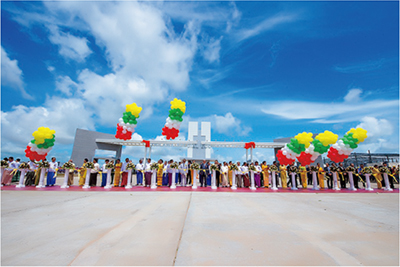 Opening ceremony of the Thilawa Special Economic Zone (SEZ) in Myanmar. Japan provides support for the SEZ in many ways, including investing in the SEZ management company, developing the surrounding infrastructure, establishing the relevant legal systems, government administration, and consideration for environment and society. (August 14, Myanmar Photo: MJTD)
Opening ceremony of the Thilawa Special Economic Zone (SEZ) in Myanmar. Japan provides support for the SEZ in many ways, including investing in the SEZ management company, developing the surrounding infrastructure, establishing the relevant legal systems, government administration, and consideration for environment and society. (August 14, Myanmar Photo: MJTD)In the Mekong region, under the “Japan-Mekong Connectivity Initiative,” newly established at the Mekong-Japan Foreign Ministers' Meeting (Laos) in July 2016, Japan is moving forward on initiatives aimed at the realization of “vibrant and effective connectivity,” including the enhancement of institutional and human connectivity as well as physical connectivity, through further infrastructure development, institutional improvement, and development of the surrounding areas in the region. Japan also announced in 2015 that it will be providing support of 750 billion Japanese yen over three years through ODA. In this regard, it announced at the 9th Japan-Mekong Summit Meeting held in the Philippines in November 2017 that it has already disbursed more than two-thirds of this assistance.
By providing such assistance, Japan aims to provide strong support to the ASEAN Community established in December 2015.
Southwest Asia holds strategic importance as a marine transportation hub that connects East Asia with the Middle East, and is also a region with countries that have immense economic potential, such as India. It is also increasingly drawing interest from Japanese companies as an export and investment destination. On the other hand, the region is still confronted by many unresolved issues such as undeveloped infrastructure and poverty. While also keeping in mind improving the investment environment for Japanese companies and human security, Japan provides a range of assistance through ODA to assist the region in overcoming these challenges.
With regard to India, on the occasion of Prime Minister Abe's visit to the country in September, the groundbreaking ceremony for the constraction of Mumbai-Ahmedabad High Speed Rail was held, and the provision of an ODA loan was signed and exchanged. In addition, the two leaders also agreed to move forward on cooperation between Japan and India for the enhancement of regional connectivity and in the development of India's North Eastern Region based on coordination between Japan's “Free and Open Indo-Pacific Strategy” and India's “Act East policy”.
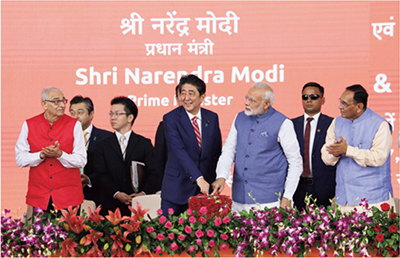 Prime Minister Abe and Prime Minister Modi attending the groundbreaking ceremony for the high-speed rail project in India (September 14, Ahmedabad, India. Photo: Cabinet Public Relations Office)
Prime Minister Abe and Prime Minister Modi attending the groundbreaking ceremony for the high-speed rail project in India (September 14, Ahmedabad, India. Photo: Cabinet Public Relations Office)With regard to Sri Lanka, at the Summit Meeting held during Prime Minister Wickremesinghe's visit to Japan in April, Prime Minister Abe announced that, to fully support Sri Lanka's development as a hub in the Indian Ocean, Japan would promote the development of infrastructure in sectors such as ports, transportation and energy through Japan's Quality Infrastructure, and support strengthening connectivity and national development. At the same time, Japan also decided to provide assistance including yen loans for the expansion of water supply and basic infrastructure development in the former conflict-affected areas.
(B) Central Asia
The Central Asia and the Caucasus are geopolitically important areas surrounded by Russia, China, South Asia, the Middle East, and Europe. Its stability and development are important for all in the whole Eurasia, including Japan. Japan supports the “open, stable, and independent” development of Central Asia, and upholds the ideal of Japanese diplomacy that contributes to peace and stability in the region and around the world. Japan supports nation building that allows fundamental values such as human rights, democracy, market economy, and the rule of law to take root for long-term stability and sustainable development in this region with broad-based views covering neighboring regions including Afghanistan and Pakistan in mind.
On the occasion of the issuance of the joint declaration for the Sixth Foreign Ministers' Meeting of the "Central Asia plus Japan" Dialogue held in Turkmenistan, Japan announced the Initiative for Cooperation in Transport and Logistics, which sets out the current and future direction of cooperation in the field of transportation and logistics. Based on this initiative, future improvements in transportation capabilities and safety through road improvements and disaster risk reduction measures are expected. Furthermore, as a result of the effective application of election-related equipment provided by Japan to the Kyrgyz Republic, which is making progress in democratization, during the parliamentary elections of 2015 and presidential elections of 2017, the elections were carried out peacefully without any major disorder. In this way, Japan also contributes to the establishment of democracy.
(C) Central and South America
Central and South America has enjoyed friendly relations with Japan for a long time and have deep historical ties with Japan, as demonstrated by the fact that about 2.1 million Japanese descendants, known as “Nikkei,” reside in the region. The region is a major supplier of resources and food, as well as a potential new market with gross regional production amounting to approximately 5 trillion US dollars. On the other hand, as many countries in the region are confronted by problems such as domestic income disparity and poverty in the agricultural and mountainous regions, Japan is engaged in various cooperative efforts while also taking into account the characteristics of each country in the Central and South America region.
Central and South America is also highly vulnerable to natural disasters, and tackling these problems is a challenge. This year, Japan dispatched members of the Japan Disaster Relief Team to Mexico in the aftermath of a major earthquake, and also supplied emergency relief supplies to countries of the Caribbean that had suffered serious damage in the hurricane.
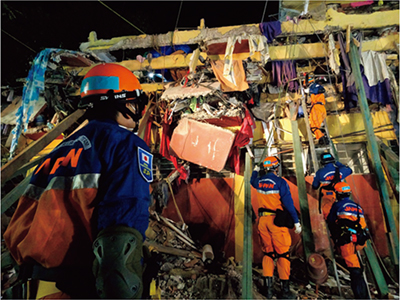 International disaster relief and rescue team engaged in search and rescue activities after the Mexico earthquake (Photo: JICA)
International disaster relief and rescue team engaged in search and rescue activities after the Mexico earthquake (Photo: JICA)Disaster risk reduction continues to be an important area in Japan's cooperation with Central and South America, and Japan continues to provide technical cooperation aimed at strengthening the abilities of these countries to cope with disasters. This includes providing equipment that is useful during times of disaster, and the Project on Capacity Development for Disaster Risk Management in Central America “BOSAI.” In addition, from the perspective of measures aimed at mitigating the damage caused by disasters, Japan is engaged in the development of disaster-resilient infrastructure through grant aid in Bolivia, Honduras, Haiti, Saint Lucia, and other parts of this region. In the fields of environment and climate change, Japan has decided to cooperate with Jamaica in promoting energy conservation, with a dollar-denominated loan as the first project.
In Central and South America, it is important to provide cooperation based on the development issues each country faces. During the visit by Prime Minister Abe in 2016, he announced that Japan will commence large-scale grant aid to Cuba. Based on the above announcement, Japan is engaged in new cooperation projects in the agricultural sector, which is a priority area in Cuba. Furthermore, Japan has also decided to provide grant aid for the disposal of landmines to Colombia, which reached a peace agreement in 2016
(D) The Middle East
Securing peace and stability in the Middle East and North Africa regions, which are geopolitically important and important for energy security, is crucial not only for the stability of Japan but also of the world. From these standpoints, Japan has proactively provided support for these regions to achieve peace and stability.
Taking the opportunity at the G7 Ise-Shima Summit held in May 2016, Japan announced that it will provide support amounting to approximately 6 billion US dollars over the three years, including support for human resource development for about 20,000 people. The objective is to build a “tolerant and stable society” in the Middle East while stemming the growth of violent extremism based on the stance that “the best way is to go in the middle.” From the perspective of extending opportunities for education to Syrian youths and fostering human resources expected to contribute to the recovery of Syria in the future, Japan announced that it will accept up to 150 Syrian students for the coming five years, and it accepted the students in 2017.
At the First Japan-Arab Political Dialogue held in Cairo, Egypt, during Foreign Minister Kono's visit to the Middle East in September, five new initiatives were announced under the “Kono Four Principles” of (1) intellectual and human contribution; (2) investment in “people;” (3) enduring efforts; and (4) enhancing political efforts. The five Initiatives were: (A) upgrading the “Corridor for Peace and Prosperity” initiative, (B) further contribution to the Multinational Force and Observers (MFO) deployed in the Sinai Peninsula, (C) expanding cooperation on education and human resources development, (D) enhancing political efforts, and (E) new humanitarian assistance for refugees and stability. As a part of these efforts, he announced that Japan would be providing fresh support of approximately 25 million US dollars towards humanitarian crises in Syria, Iraq, and the neighboring countries, with the aim of preventing further instability in the region. Furthermore, concerning investment in “People”, for the purpose of developing cooperation in the education field under the Egypt-Japan Education Partnership (EJEP), Foreign Minister Taro Kono explained Japan's policy to offer an ODA loan for Japanese-style education being introduced by the Government of Egypt, as well as a grant aid for educational and research equipment at the Egypt-Japan University of Science and Technology (E-JUST).
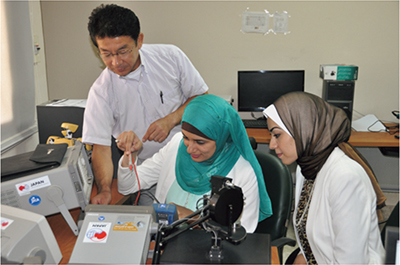 Japanese experts guiding students at the Egypt-Japan University of Science and Technology (E-JUST) (Photo: JICA)
Japanese experts guiding students at the Egypt-Japan University of Science and Technology (E-JUST) (Photo: JICA)In December, Foreign Minister Kono attended the 13th Manama Dialogue, where he announced the fresh provision of around 21 million US dollars for humanitarian assistance to Syria and the neighboring countries, as Japan's continued support to countries that have been affected by the fight against ISIL and others. With this, in 2017 alone, Japan's assistance in total will reach over 100 million US dollars for all Syrian people in need inside Syria and around 320 million US dollars in Iraq, Syria and its neighboring countries.
During the same month, Foreign Minister Kono made a tour of the Middle East countries, and delivered a speech at the commemorative ceremony for the kick-off of phase 2 of the Jericho Agro-Industrial Park (JAIP) project in Palestine. During his speech, he declared that Japan will be upgrading the “Corridor for Peace and Prosperity” initiative. In addition to providing support for ICT and facilitating smooth logistics, he revealed Japan's plans to provide fresh support for Palestine amounting to approximately 40 million US dollars.
(E) Africa
Africa has achieved a significant economic growth thanks to its abundant natural resources and a rapidly growing population. As a potential market, it is attracting the attention and anticipation of the international community. Since 1993, Japan has worked with African countries as well as supporting countries and organizations to tackle Africa's development issues through the processes of the Tokyo International Conference on African Development (TICAD), and continued to provide support towards the realization of economic growth in Africa. The TICAD processes further strengthen relations between Japan and Africa, and serve as a forum for discussing the further development of Africa while respecting the ownership of the African countries. For these reasons, the TICAD framework has been highly appraised by the countries of Africa. In August 2016, TICAD VI was held in Nairobi, Kenya, the first TICAD meeting to be held in Africa. The Nairobi Declaration was adopted with three priority areas as its pillars: (1) Diversification and industrialization of the economy; (2) Promotion of resilient health systems; and (3) Stabilizing society. Prime Minister Abe, who co-chaired the conference, announced during his keynote speech that Japan will be investing a total of 30 billion US dollars jointly from the public and private sectors, over three years from 2016 to 2018, towards Africa's future. This investment will go towards the development of about 10 million human resources by harnessing Japan's strength of high quality, and follow the three priority areas set out in the Nairobi Declaration. In 2017, these efforts were implemented steadily. The TICAD Ministerial Meeting was held in August in Maputo, the capital of Mozambique. Foreign Minister Kono, who attended the meeting as its co-chair, spoke about the status of progress of Japan's initiatives in line with its commitments made at TICAD V and TICAD VI.
Japan also takes full advantage of the opportunities presented by exchanges of key persons to promote initiatives under the TICAD process. On the occasion of the visit from President Rajaonarimampianina of Madagascar to Japan in December, the two countries agreed to strengthen cooperation on food security and safe water, which are priority areas set out in TICAD VI. In addition, on the occasion of the visit from President Sall of Senegal to Japan during the same month, the two countries also agreed to strengthen cooperation on health, infrastructure, and food security.
The next TICAD, which will be TICAD 7, is scheduled to be held in Yokohama in 2019. Japan will harness its strengths to provide steady support in areas such as economic growth that incorporates private-sector investment, development, and the promotion of social stability. At the same time, Japan will build mutually beneficial relationships with the countries of Africa and will continue to contribute to the realization of Africa's “quality growth” through cooperation between the public and private sectors.
(3) Approaches to Appropriate and Effective Implementation of ODA
A Approaches to Appropriate Implementation of ODA
In the implementation of ODA, efforts are made to enhance transparency by exchanging views with external experts at each phase and formulating projects based on these discussions. In the phase of preliminary studies in the implementation of ODA, the Development Project Accountability Committee holds open sessions and decides whether studies should be implemented based on reviews and discussions conducted with external experts. Furthermore, after the implementation of the project, JICA publishes on its website the ex-post evaluation results for all projects valued at 200 million Japanese yen or more, while ex-post evaluations are also conducted by third parties for projects valued at 1 billion Japanese yen or more. With regard to grant aid projects implemented by the Ministry of Foreign Affairs, an ex-post evaluation system has also been introduced since FY2017. Internal ex-post evaluations are carried out for projects over 200 million Japanese yen or more, and the results of the evaluation are published, while external ex-post evaluations are conducted for projects over 1 billion Japanese yen or more. The matters pointed out in such ex-post evaluations are applied to the formulation of future ODA projects.
B Approaches to Effective Implementation of ODA
ODA is implemented through three frameworks corresponding to the needs of the partner country and the scale of the project: grant aid, loan aid, and technical cooperation. In order to utilize the limited budget efficiently and achieve a high level of development, MOFA and JICA take into account the needs of the partner country, establish priority areas of cooperation for each country, and formulate projects that contribute to these areas while going beyond the boundaries of each framework. For example, as the agricultural sector makes up about 30% of Myanmar's GDP, development of agriculture is extremely important in order to improve the lives of the people. From this perspective, Japan has been dispatching experts since October 2017 to expand systems for the widespread propagation of good seeds, as a part of technical cooperation. In November, it also decided to finance, through an ODA loan, the refurbishment of irrigation facilities, improvements of farm roads and bridges, development of approximately 2,000 hectares of farming fields, and establishment of a seed center, with the aim of improving the income of farmers in Myanmar. In this way, Japan combines various support schemes to improve efficiency of the overall value-chain of agricultural produce.
Japan also contributes to the creation of international frameworks for effective ODA implementation. The Global Partnership for Effective Development Cooperation (GPEDC) exists as a framework that various development entities participate in with the aim of enabling the international community to work as one towards improving the effectiveness of development cooperation for developing countries. These entities are not limited to developed and developing countries, but also include civil society, the private sector and so on. Japan has been serving on the Steering Committee of the GPEDC since September 2015. At the 2nd High-level Meeting of the GPEDC held in November 2016 as well as other related fora, Japan introduced its initiatives in effective development cooperation, such as triangular cooperation and investment in quality infrastructure, and these initiatives were highly appraised by other participants.
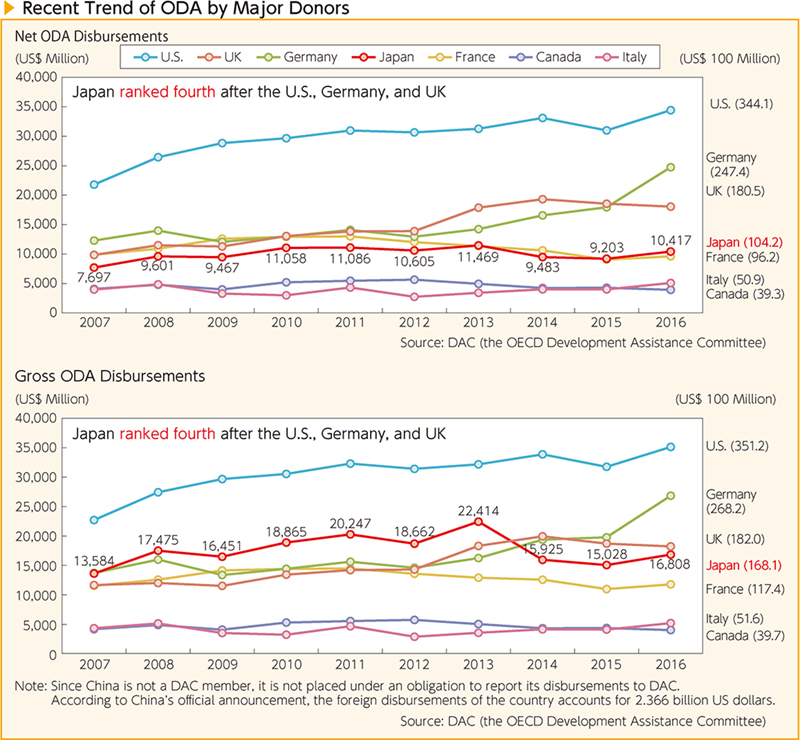
C Efforts toward Promotion of Information Disclosure and Improvement Development of Cooperation Quality
The understanding and support from Japanese citizens is essential for the implementation of development cooperation. Therefore, efforts are made for effective communication and higher quality of development cooperation to enhance their understanding of ODA. Various PR events took place aiming to reach out to a wide range of people. Specifically, participatory type events such as “Global Festa Japan 2017” (September 30 and October 1), Japan's largest event for international cooperation, in Odaiba, Tokyo, and “One World Festival” in Osaka City in February were held. In addition to these, TV publicity programs (Special program “Team Earth Smile of the Interstellar Spacecraft Oriental” and mini program “MA-SA's Discovery – Smile Earth”) were broadcasted to present some examples of international cooperation activities by Japan all over the world, and to explain the meaning of development cooperation for Japan in an easy-to- understand manner, based on the reports from ODA sites in developing countries. Also, efforts are continuously made to deliver information on development cooperation through the ODA website. Furthermore, based on the Development Cooperation Charter, which declares enhanced efforts for overseas publicity, Japan plans tours to its development cooperation project sites for the local media so that they will cover Japan's cooperation, and prepares PR pamphlets in English and local languages.
In order to raise the quality of ODA, it is necessary to apply knowledge and know-how gained from ODA evaluations to subsequent policy planning and project implementation. MOFA mainly carries out evaluations by external experts at policy and program levels, and the results are shared and used by relevant parties. Also, from the viewpoint of improving transparency of the JICA's projects, the JICA publicizes their current status and achievements on the “Visible ODA” section of its website. As of the end of December 2017, a total of 3,957 projects are listed on this site.
